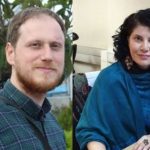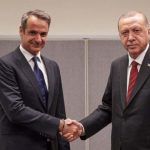Ukraine’s foreign minister, Dmytro Kuleba, said there had been no progress to achieving a ceasefire in talks in Turkey with his Russian counterpart, Sergei Lavrov, in the first high-level meeting between the two countries since the Moscow-ordered invasion of its neighbour two weeks ago.
Talks got under way near Antalya amid an outpouring of international outrage over Russia’s attack on a children’s hospital in the besieged city of Mariupol. The bombing of the 600-bed children’s and maternity hospital that injured pregnant women was evidence of “genocide” Ukraine’s president, Volodymyr Zelenskiy, said. The White House called the attack barbaric.
As western leaders condemned the bombing, Ukraine’s foreign minister and officials were pictured sitting opposite the Russian delegation as the brief talks that Kuleba described as both “easy and difficult” got under way.
In comments after the talks broke up, Lavrov said the hospital had been under the control of “Ukrainian radicals” and denied that any patients were present. He said the west had caused the conflict by forcing Ukraine to choose between Russia and the west.
Kuleba called for Russia to allow the evacuation of civilians from Mariupol. He said Ukraine was ready for diplomacy but also able to defend itself as it appeared that Russia would fight on and was seeking a surrender from Kyiv.
Turkey’s foreign minister, Mevlüt Çavuşoğlu, who brokered the meeting, said before it began that the aim was to pave the way for talks between Russian president Vladimir Putin and Zelenskiy, facilitated by Turkey’s leader, Recep Tayip Erdoğan. Turkey, which is a Nato member and which has not imposed sanctions on Russia but has condemned the attack and allowed Turkish-built drones to be bought by Ukraine, is trying to position itself as a neutral broker in the conflict.
The Kremlin has said it would stop the war if Ukraine ceased military action, enshrined in its constitution that it had no plans to join Nato, gave up annexed Crimea and recognised the separatist regions of Donetsk and Luhansk as independent states.
EU leaders, meanwhile, prepared to meet at Versailles to discuss Ukraine’s application to join their ranks.
Ahead of the Versailles summit, convened by France’s President Emmanuel Macron, Kuleba stepped up the pressure on the EU to grant Ukraine a fast-track route to membership. Recounting a phone call he had with his French counterpart, Jean-Yves Le Drian, Kuleba tweeted that he had “underscored the historic importance of granting EU membership to Ukraine which now fights for itself and entire Europe”.
While Ukraine’s membership bid, swiftly followed by applications from Georgia and Moldova, has been warmly welcomed by central and eastern European countries, older members are wary of moving too quickly, with a country at war that has long struggled with deep-rooted corruption.
“This will not happen in the short term, because this is a whole process taking many years,” the Dutch prime minister Mark Rutte said. France’s Europe minister, Clément Beaune, agreed, saying: “It will take time.”
Acknowledging the divisions, a senior EU official said: “Part of the room wants to move swiftly, another part of the room of leaders wants to have some better distance and see, and have a proper discussion at a later stage whether Ukraine should join the union.”
Despite pressure from central and eastern European governments, the draft summit communique does not mention the EU’s membership application clause, treaty article 49.
Instead, EU leaders will invite the European Commission to submit an opinion on Ukraine’s application – the normal bureaucratic procedure – “pending this and without delay, we will further strengthen our bonds and deepen our partnership”, states a draft summit statement seen by the Guardian, with the recent addition: “Ukraine belongs to our European family.”
Separately, the UK announced on Thursday that it was adding seven Russian businessmen to its sanctions list, including the metals billionaire and Chelsea football club owner Roman Abramovich, described by the Foreign Office as “one of the few oligarchs from the 1990s to maintain prominence under Putin”.
The British government is also imposing asset freezes on Putin ally Igor Sechin, the owner of Russian state oil company Rosneft, and Oleg Deripaska, an aluminium magnate believed by the Foreign Office to be worth £2bn.
Britain and the US are warning that Russia could be setting the stage to use a chemical weapon in Ukraine after Kremlin officials alleged without firm evidence that the US had been supporting a bioweapons programme in the country. The White House press secretary Jen Psaki said on Wednesday that Russia had been making “false claims about alleged US biological weapons labs and chemical weapons development in Ukraine”, adding that the allegations had been echoed in Beijing.
“Now that Russia has made these false claims, and China has seemingly endorsed this propaganda, we should all be on the lookout for Russia to possibly use chemical or biological weapons in Ukraine, or to create a false flag operation using them,” she tweeted.
Meanwhile UK intelligence highlighted the strength of the Ukrainian resistance. In an update on Thursday, Britain’s Ministry of Defence said the large Russian column north-west of Kyiv had made “little progress in over a week” and suffers continued losses at the hands of Ukraine forces. The MoD added that there had been a noticeable drop in Russian air activity in recent days, probably due to the “unexpected effectiveness” of Ukraine’s forces. It also said Russia has deployed conscript troops despite assurances from Putin not to do so.
As the Russian president seeks to regain momentum, local authorities described the damage to the Mariupol hospital as “colossal” and said women in labour were among the wounded. A local official said the attack injured at least 17 staff, though no deaths were immediately reported. Zelenskiy said the “direct strike by Russian troops” had left children under the wreckage.
The deputy mayor, Sergei Orlov, said Mariupol was being shelled continuously and 1,170 residents had died, 47 of whom were buried in a mass grave on Wednesday. “It’s medieval,” he said. “It’s pure genocide. The attack isn’t simply treacherous. It’s a war crime. They are attacking us with aviation, shells, multiple rocket launchers.”
The Guardian was unable to verify the Ukrainian officials’ accounts, but video published by the Associated Press showed multiple injured people at the site of the hospital attack.
The Red Cross has described conditions in the port city as “apocalyptic”, while the deputy prime minister, Iryna Vereshchuk, said the situation was “catastrophic”. Zelenskiy compared the devastation and suffering there to that caused by the Nazis.
Journalists have described corpses in the streets and hungry residents breaking into shops in search of food and being forced to melt snow for drinking water while thousands shelter in basements.
Jennifer Rankin , Julian Borger in Washington, Dan Sabbagh and Luke Harding in Lviv
Source: Guardian



